Ethical Futures Essay: Politics, Policy, and Education
VerifiedAdded on 2019/11/19
|6
|1229
|186
Essay
AI Summary
This essay, titled "Ethical Futures," delves into the intricate relationship between politics, policy making, and education, particularly within the context of early childhood education. It defines policy as a process of defining problems and outlines how policies express governmental intentions. The essay emphasizes the significance of policy studies in equipping individuals with critical thinking skills and promoting informed citizenship. It examines various approaches to policy analysis, highlighting the influence of ideology, discourse, and social constructs on policy formation. The essay then focuses on the critical role of early childhood institutions in policy making, including their influence on shaping future visions and the impact of politicians. A case study of the National Assessment Program Literacy and Numeracy (NAPLAN) is used to illustrate contemporary issues in education policy, including the consequences of high-stakes testing on teachers, parents and children, and the assessment's influence on parents' attitudes towards their children's information.
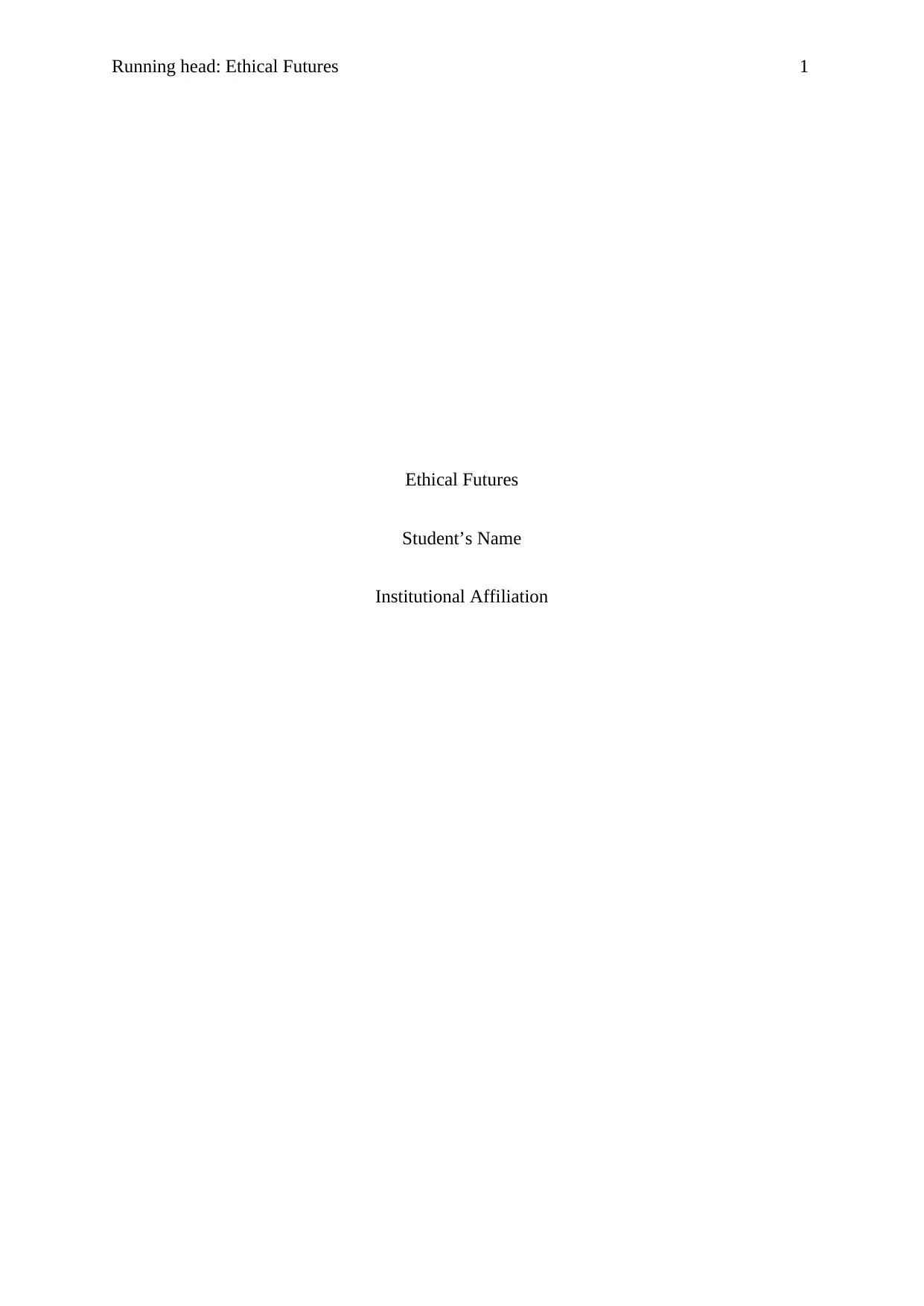
Running head: Ethical Futures 1
Ethical Futures
Student’s Name
Institutional Affiliation
Ethical Futures
Student’s Name
Institutional Affiliation
Paraphrase This Document
Need a fresh take? Get an instant paraphrase of this document with our AI Paraphraser
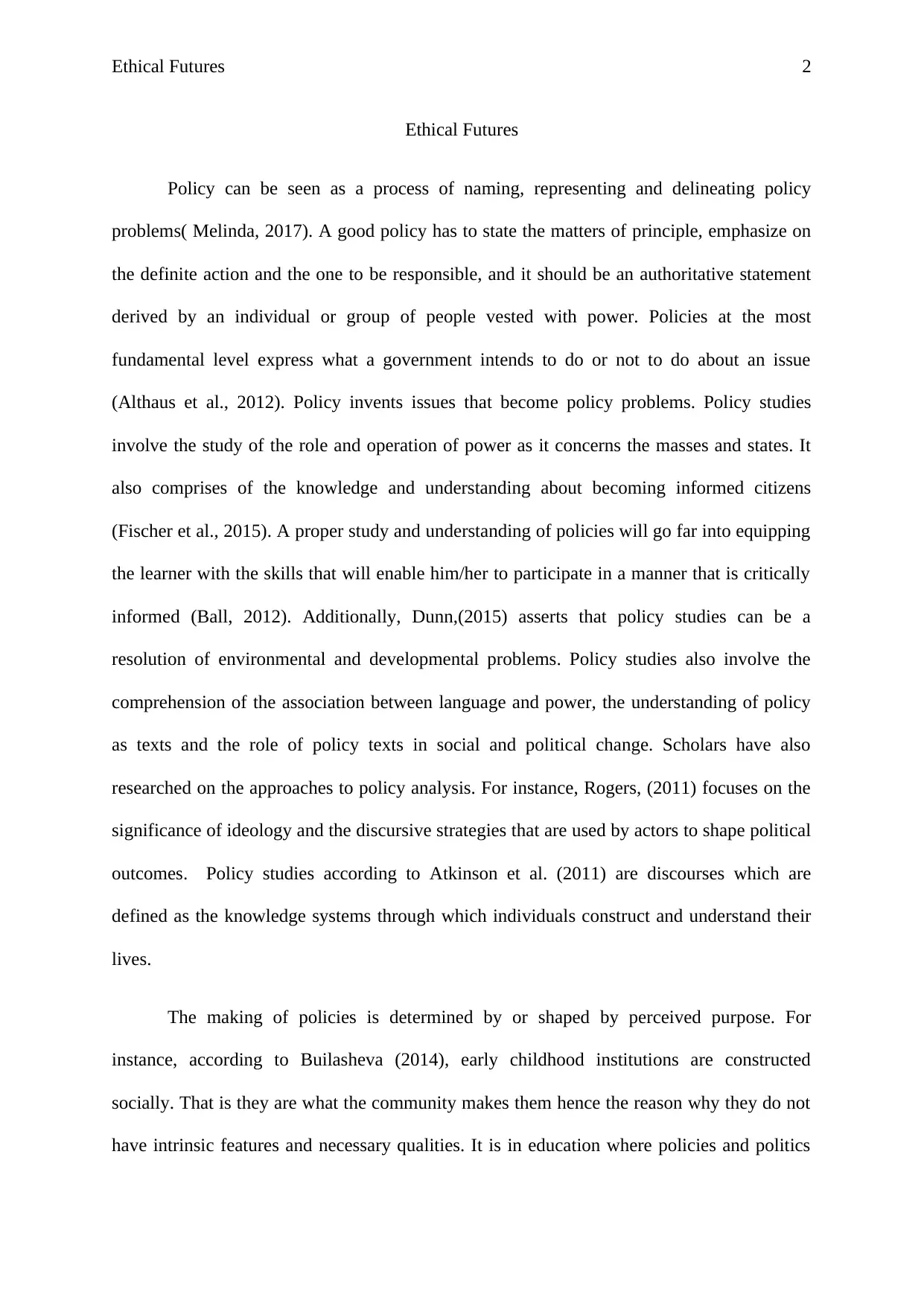
Ethical Futures 2
Ethical Futures
Policy can be seen as a process of naming, representing and delineating policy
problems( Melinda, 2017). A good policy has to state the matters of principle, emphasize on
the definite action and the one to be responsible, and it should be an authoritative statement
derived by an individual or group of people vested with power. Policies at the most
fundamental level express what a government intends to do or not to do about an issue
(Althaus et al., 2012). Policy invents issues that become policy problems. Policy studies
involve the study of the role and operation of power as it concerns the masses and states. It
also comprises of the knowledge and understanding about becoming informed citizens
(Fischer et al., 2015). A proper study and understanding of policies will go far into equipping
the learner with the skills that will enable him/her to participate in a manner that is critically
informed (Ball, 2012). Additionally, Dunn,(2015) asserts that policy studies can be a
resolution of environmental and developmental problems. Policy studies also involve the
comprehension of the association between language and power, the understanding of policy
as texts and the role of policy texts in social and political change. Scholars have also
researched on the approaches to policy analysis. For instance, Rogers, (2011) focuses on the
significance of ideology and the discursive strategies that are used by actors to shape political
outcomes. Policy studies according to Atkinson et al. (2011) are discourses which are
defined as the knowledge systems through which individuals construct and understand their
lives.
The making of policies is determined by or shaped by perceived purpose. For
instance, according to Builasheva (2014), early childhood institutions are constructed
socially. That is they are what the community makes them hence the reason why they do not
have intrinsic features and necessary qualities. It is in education where policies and politics
Ethical Futures
Policy can be seen as a process of naming, representing and delineating policy
problems( Melinda, 2017). A good policy has to state the matters of principle, emphasize on
the definite action and the one to be responsible, and it should be an authoritative statement
derived by an individual or group of people vested with power. Policies at the most
fundamental level express what a government intends to do or not to do about an issue
(Althaus et al., 2012). Policy invents issues that become policy problems. Policy studies
involve the study of the role and operation of power as it concerns the masses and states. It
also comprises of the knowledge and understanding about becoming informed citizens
(Fischer et al., 2015). A proper study and understanding of policies will go far into equipping
the learner with the skills that will enable him/her to participate in a manner that is critically
informed (Ball, 2012). Additionally, Dunn,(2015) asserts that policy studies can be a
resolution of environmental and developmental problems. Policy studies also involve the
comprehension of the association between language and power, the understanding of policy
as texts and the role of policy texts in social and political change. Scholars have also
researched on the approaches to policy analysis. For instance, Rogers, (2011) focuses on the
significance of ideology and the discursive strategies that are used by actors to shape political
outcomes. Policy studies according to Atkinson et al. (2011) are discourses which are
defined as the knowledge systems through which individuals construct and understand their
lives.
The making of policies is determined by or shaped by perceived purpose. For
instance, according to Builasheva (2014), early childhood institutions are constructed
socially. That is they are what the community makes them hence the reason why they do not
have intrinsic features and necessary qualities. It is in education where policies and politics
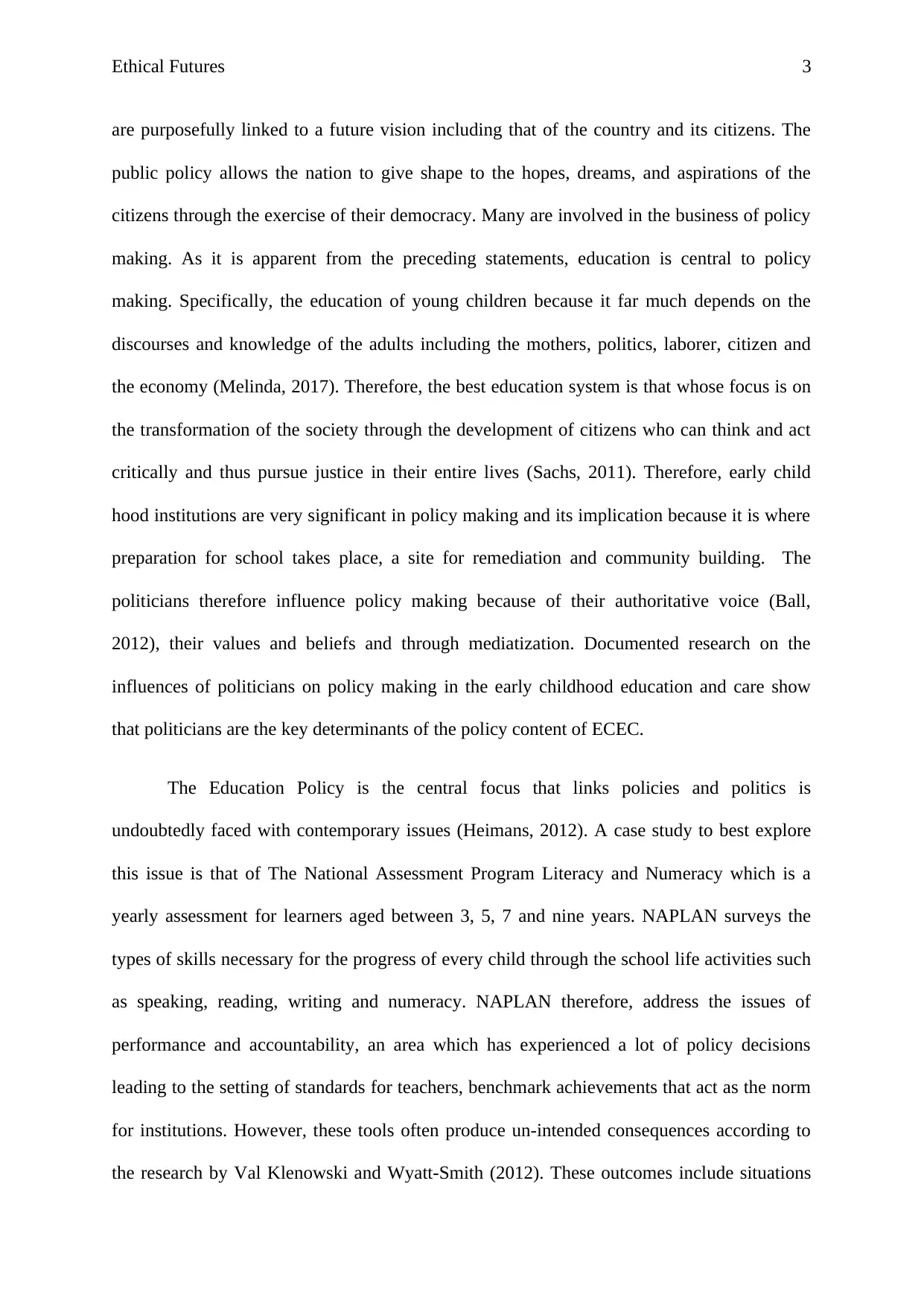
Ethical Futures 3
are purposefully linked to a future vision including that of the country and its citizens. The
public policy allows the nation to give shape to the hopes, dreams, and aspirations of the
citizens through the exercise of their democracy. Many are involved in the business of policy
making. As it is apparent from the preceding statements, education is central to policy
making. Specifically, the education of young children because it far much depends on the
discourses and knowledge of the adults including the mothers, politics, laborer, citizen and
the economy (Melinda, 2017). Therefore, the best education system is that whose focus is on
the transformation of the society through the development of citizens who can think and act
critically and thus pursue justice in their entire lives (Sachs, 2011). Therefore, early child
hood institutions are very significant in policy making and its implication because it is where
preparation for school takes place, a site for remediation and community building. The
politicians therefore influence policy making because of their authoritative voice (Ball,
2012), their values and beliefs and through mediatization. Documented research on the
influences of politicians on policy making in the early childhood education and care show
that politicians are the key determinants of the policy content of ECEC.
The Education Policy is the central focus that links policies and politics is
undoubtedly faced with contemporary issues (Heimans, 2012). A case study to best explore
this issue is that of The National Assessment Program Literacy and Numeracy which is a
yearly assessment for learners aged between 3, 5, 7 and nine years. NAPLAN surveys the
types of skills necessary for the progress of every child through the school life activities such
as speaking, reading, writing and numeracy. NAPLAN therefore, address the issues of
performance and accountability, an area which has experienced a lot of policy decisions
leading to the setting of standards for teachers, benchmark achievements that act as the norm
for institutions. However, these tools often produce un-intended consequences according to
the research by Val Klenowski and Wyatt-Smith (2012). These outcomes include situations
are purposefully linked to a future vision including that of the country and its citizens. The
public policy allows the nation to give shape to the hopes, dreams, and aspirations of the
citizens through the exercise of their democracy. Many are involved in the business of policy
making. As it is apparent from the preceding statements, education is central to policy
making. Specifically, the education of young children because it far much depends on the
discourses and knowledge of the adults including the mothers, politics, laborer, citizen and
the economy (Melinda, 2017). Therefore, the best education system is that whose focus is on
the transformation of the society through the development of citizens who can think and act
critically and thus pursue justice in their entire lives (Sachs, 2011). Therefore, early child
hood institutions are very significant in policy making and its implication because it is where
preparation for school takes place, a site for remediation and community building. The
politicians therefore influence policy making because of their authoritative voice (Ball,
2012), their values and beliefs and through mediatization. Documented research on the
influences of politicians on policy making in the early childhood education and care show
that politicians are the key determinants of the policy content of ECEC.
The Education Policy is the central focus that links policies and politics is
undoubtedly faced with contemporary issues (Heimans, 2012). A case study to best explore
this issue is that of The National Assessment Program Literacy and Numeracy which is a
yearly assessment for learners aged between 3, 5, 7 and nine years. NAPLAN surveys the
types of skills necessary for the progress of every child through the school life activities such
as speaking, reading, writing and numeracy. NAPLAN therefore, address the issues of
performance and accountability, an area which has experienced a lot of policy decisions
leading to the setting of standards for teachers, benchmark achievements that act as the norm
for institutions. However, these tools often produce un-intended consequences according to
the research by Val Klenowski and Wyatt-Smith (2012). These outcomes include situations
⊘ This is a preview!⊘
Do you want full access?
Subscribe today to unlock all pages.

Trusted by 1+ million students worldwide
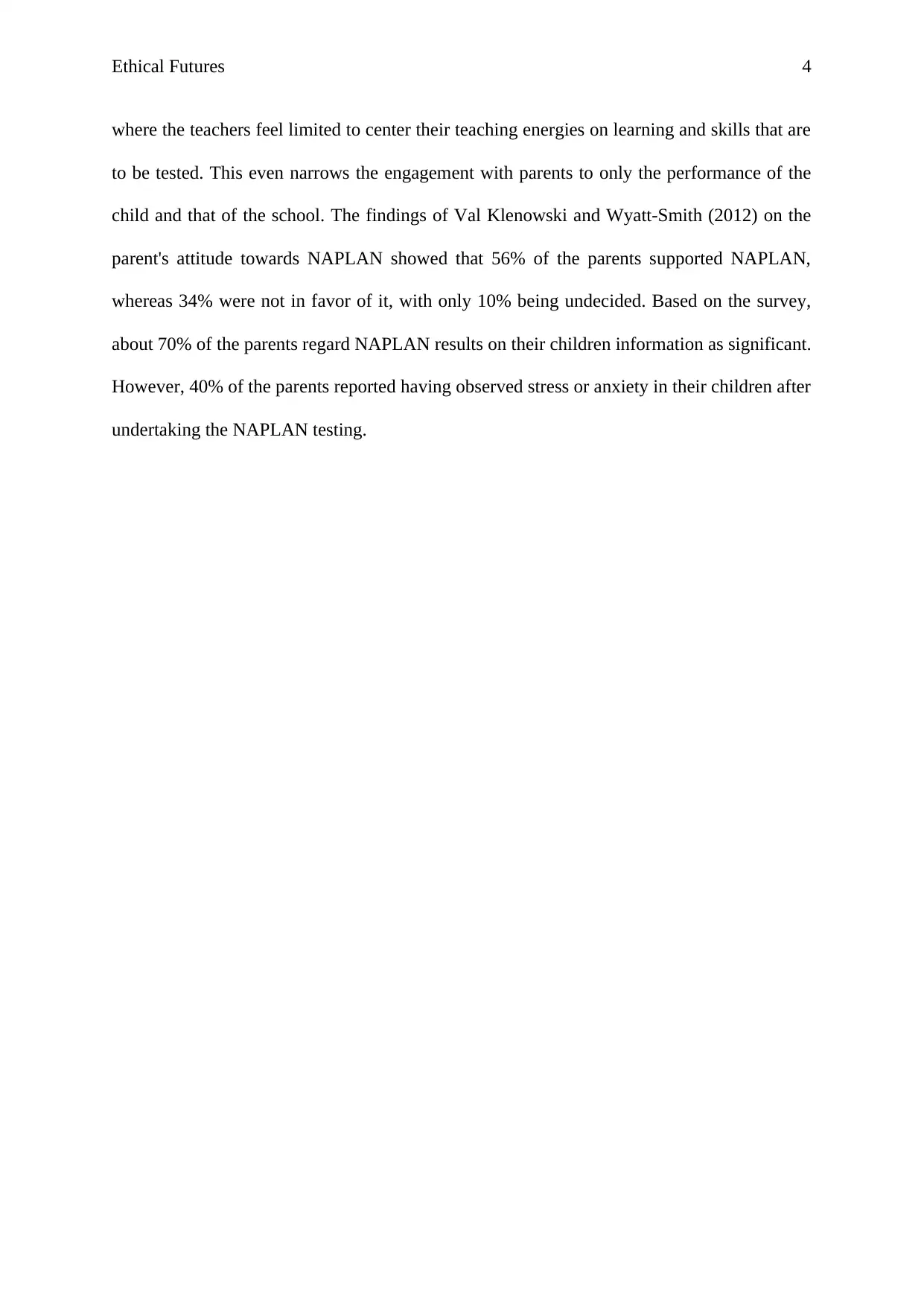
Ethical Futures 4
where the teachers feel limited to center their teaching energies on learning and skills that are
to be tested. This even narrows the engagement with parents to only the performance of the
child and that of the school. The findings of Val Klenowski and Wyatt-Smith (2012) on the
parent's attitude towards NAPLAN showed that 56% of the parents supported NAPLAN,
whereas 34% were not in favor of it, with only 10% being undecided. Based on the survey,
about 70% of the parents regard NAPLAN results on their children information as significant.
However, 40% of the parents reported having observed stress or anxiety in their children after
undertaking the NAPLAN testing.
where the teachers feel limited to center their teaching energies on learning and skills that are
to be tested. This even narrows the engagement with parents to only the performance of the
child and that of the school. The findings of Val Klenowski and Wyatt-Smith (2012) on the
parent's attitude towards NAPLAN showed that 56% of the parents supported NAPLAN,
whereas 34% were not in favor of it, with only 10% being undecided. Based on the survey,
about 70% of the parents regard NAPLAN results on their children information as significant.
However, 40% of the parents reported having observed stress or anxiety in their children after
undertaking the NAPLAN testing.
Paraphrase This Document
Need a fresh take? Get an instant paraphrase of this document with our AI Paraphraser
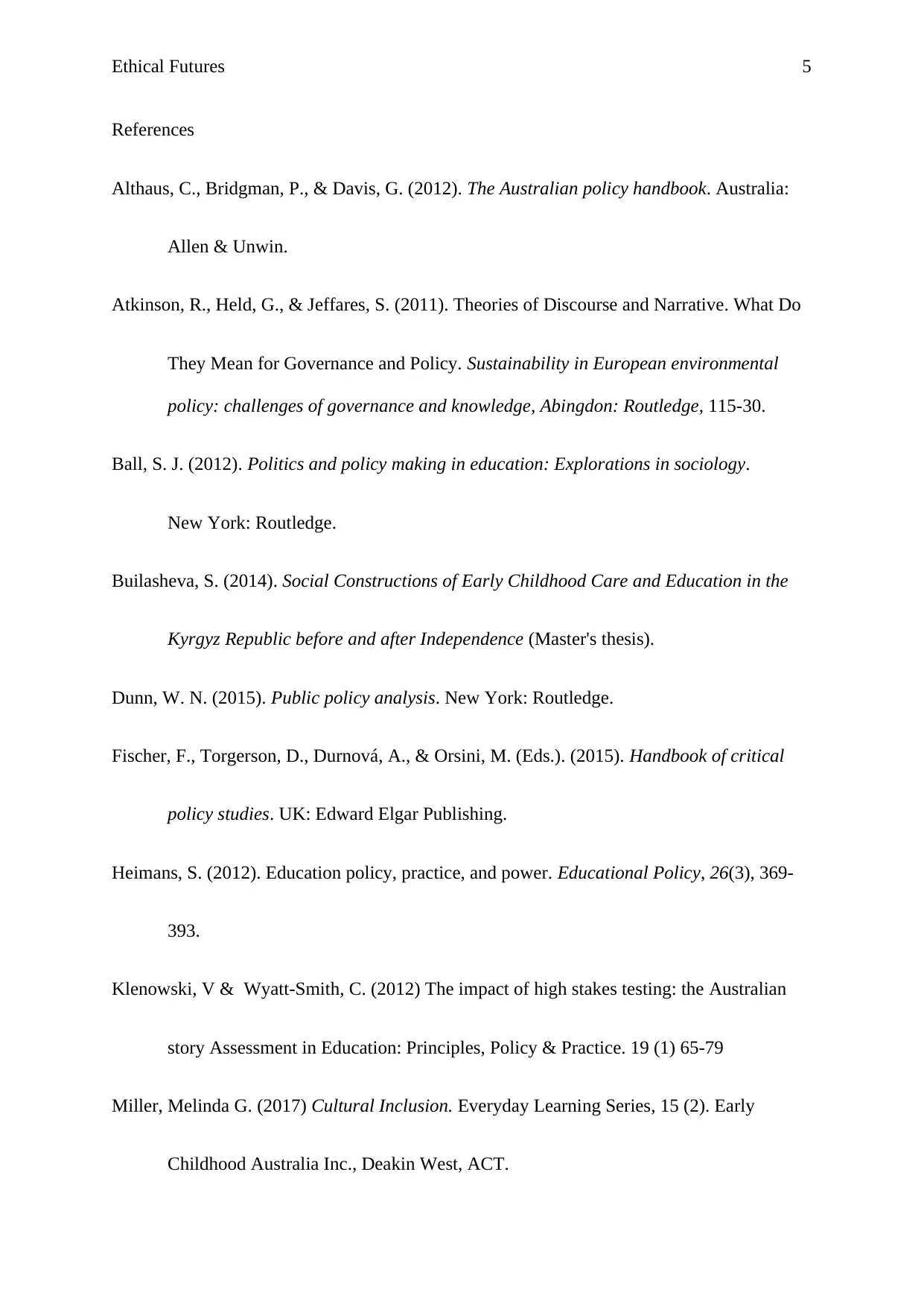
Ethical Futures 5
References
Althaus, C., Bridgman, P., & Davis, G. (2012). The Australian policy handbook. Australia:
Allen & Unwin.
Atkinson, R., Held, G., & Jeffares, S. (2011). Theories of Discourse and Narrative. What Do
They Mean for Governance and Policy. Sustainability in European environmental
policy: challenges of governance and knowledge, Abingdon: Routledge, 115-30.
Ball, S. J. (2012). Politics and policy making in education: Explorations in sociology.
New York: Routledge.
Builasheva, S. (2014). Social Constructions of Early Childhood Care and Education in the
Kyrgyz Republic before and after Independence (Master's thesis).
Dunn, W. N. (2015). Public policy analysis. New York: Routledge.
Fischer, F., Torgerson, D., Durnová, A., & Orsini, M. (Eds.). (2015). Handbook of critical
policy studies. UK: Edward Elgar Publishing.
Heimans, S. (2012). Education policy, practice, and power. Educational Policy, 26(3), 369-
393.
Klenowski, V & Wyatt-Smith, C. (2012) The impact of high stakes testing: the Australian
story Assessment in Education: Principles, Policy & Practice. 19 (1) 65-79
Miller, Melinda G. (2017) Cultural Inclusion. Everyday Learning Series, 15 (2). Early
Childhood Australia Inc., Deakin West, ACT.
References
Althaus, C., Bridgman, P., & Davis, G. (2012). The Australian policy handbook. Australia:
Allen & Unwin.
Atkinson, R., Held, G., & Jeffares, S. (2011). Theories of Discourse and Narrative. What Do
They Mean for Governance and Policy. Sustainability in European environmental
policy: challenges of governance and knowledge, Abingdon: Routledge, 115-30.
Ball, S. J. (2012). Politics and policy making in education: Explorations in sociology.
New York: Routledge.
Builasheva, S. (2014). Social Constructions of Early Childhood Care and Education in the
Kyrgyz Republic before and after Independence (Master's thesis).
Dunn, W. N. (2015). Public policy analysis. New York: Routledge.
Fischer, F., Torgerson, D., Durnová, A., & Orsini, M. (Eds.). (2015). Handbook of critical
policy studies. UK: Edward Elgar Publishing.
Heimans, S. (2012). Education policy, practice, and power. Educational Policy, 26(3), 369-
393.
Klenowski, V & Wyatt-Smith, C. (2012) The impact of high stakes testing: the Australian
story Assessment in Education: Principles, Policy & Practice. 19 (1) 65-79
Miller, Melinda G. (2017) Cultural Inclusion. Everyday Learning Series, 15 (2). Early
Childhood Australia Inc., Deakin West, ACT.
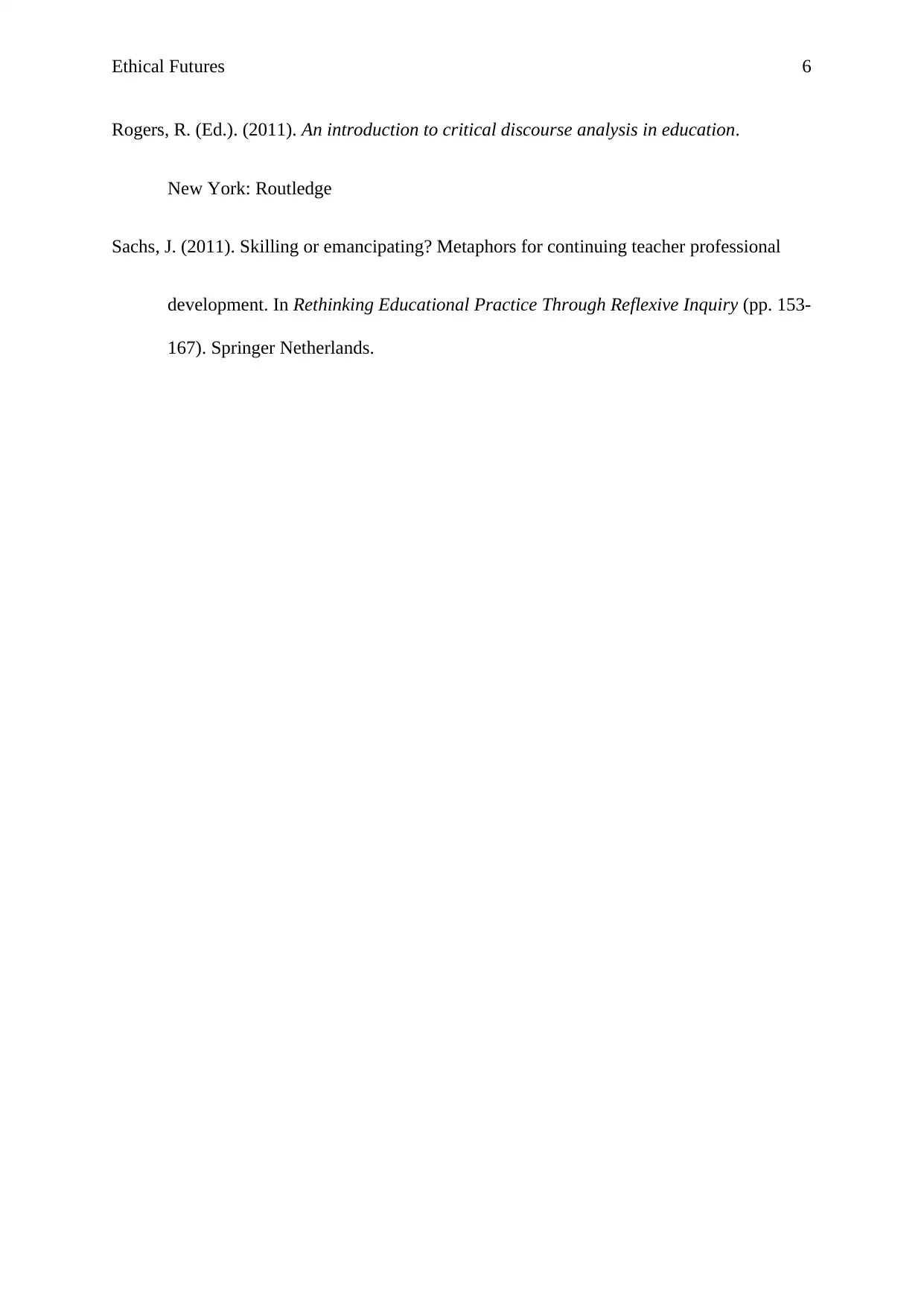
Ethical Futures 6
Rogers, R. (Ed.). (2011). An introduction to critical discourse analysis in education.
New York: Routledge
Sachs, J. (2011). Skilling or emancipating? Metaphors for continuing teacher professional
development. In Rethinking Educational Practice Through Reflexive Inquiry (pp. 153-
167). Springer Netherlands.
Rogers, R. (Ed.). (2011). An introduction to critical discourse analysis in education.
New York: Routledge
Sachs, J. (2011). Skilling or emancipating? Metaphors for continuing teacher professional
development. In Rethinking Educational Practice Through Reflexive Inquiry (pp. 153-
167). Springer Netherlands.
⊘ This is a preview!⊘
Do you want full access?
Subscribe today to unlock all pages.

Trusted by 1+ million students worldwide
1 out of 6
Your All-in-One AI-Powered Toolkit for Academic Success.
+13062052269
info@desklib.com
Available 24*7 on WhatsApp / Email
![[object Object]](/_next/static/media/star-bottom.7253800d.svg)
Unlock your academic potential
Copyright © 2020–2025 A2Z Services. All Rights Reserved. Developed and managed by ZUCOL.


